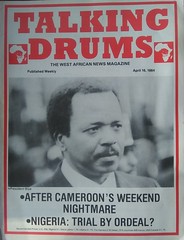Buhari: Our Achievements So Far
To mark his first 100 days in office Maj-Gen Muhammadu Buhari, Head of State delivered a state of the Nation address, excerpts of which are reproduced belowThis administration came into being on 31st December 1983 when the Nigerian armed forces intervened. In my maiden speech to the nation, I identified the failures of the civilian administration and the problems confronting our country in four main areas:
1. Mismanagement of the economy, lack of financial discipline, huge external debt, over-dependence on internal and external borrowing, heavy budget deficit and a weak balance of payments position.
2. Lack of public accountability, indiscipline, kickbacks and other forms of corruption, inflation of contract sums, over-invoicing of imports, smuggling, illegal dealings in foreign exchange, forgery, fraud, embezzlement, misuse and abuse of office, arson and so on.
3. Intolerable suffering and general deterioration in the standard of living of the common man, scarcity of food and galloping inflation, closure of factories which were unable to obtain import licences for their raw materials while such licences were issued to the wrong people, and unemployment.
4. The insensitivity of the political leadership. Our people were suffering while the leadership were wallowing in affluence. The unity and stability of the nation were severely threatened by the widespread perversion, arbitrary processes and the unquestionable harm which the politicians have done to our reputation as a nation.
I have decided to address the nation and place before you a record of the activities of the administration during this period as well as indicate the extent to which the administration's objectives are being implemented. I will now take these objectives one by one.
Maintenance of national unity and stability: It is clear that the intervention by the armed forces gave a new lease of life to the nation. The Supreme Military Council, the National Council of State and the Federal Executive Council are all functioning normally.
Responsibilities have been assigned to the Ministries. The objectives, policies and programmes of the administration have been published in a document described as a Blue Book. All the Ministries will now proceed to implement programmes for which the Blue Book provides broad policy guidelines. The State Governments are functioning effectively.
Investigations into corrupt practices: Substantial progress has been made in the investigation of corrupt practices by former politicians, public and government officials and middlemen. Cases have been documented. In the process, substantial amounts of money was found in their possession. Ill-gotten gains have been recovered from some former politicians. The persons accused of offences for the recovery of government property will be arraigned before the tribunal whether they are in the country or outside.
Fugitives: The return of the dismissed politicians who fled abroad and are threatening to destabilise this country from their faraway hiding places has been hampered by diplomatic and legal complications over their extradition. The Government is determined to bring them back, however, no matter how long it takes. We are also keeping a very close watch on the antics of the fugitives and any attempt by them or their collaborators to cause trouble for the country will be dealt with firmly.
Foreign affairs: A number of heads envoys have visited Nigeria either as a follow-up to the special missions which I sent out in January to some friendly position. countries to explain the situation in Nigeria or to ascertain for themselves what has really happened. All these visiting missions were given every facility to learn for themselves that the Federal Military Government has the support of the masses of our people and that the armed forces are firmly in control of the situation here.
Economic measures:
1. Negotiations are in progress to refinance Nigeria's short-term trade arrears estimated at 4,500 million dollars. The United States of America, United Kingdom, France, West Germany, Italy and Japan have been generally receptive to our request for a review and rescheduling of Nigeria's foreign commitments provided negotiations for an IMF programme, including a devaluation of the naira, are successful.
2. Negotiations for an IMF programme continue. The IMF agrees with the measures so far taken by the new administration which conform generally with the recommendations of the IMF except in areas where, on grounds of national interest, we differ. Differences persist over the insistence of the IMF on substantial initial devaluation of the naira. Nevertheless, we hope that an IMF programme will be in place early in July 1984, although this administration will not compromise on its position that the terms of the loans must be in Nigeria's best interest.
3. Discussions for a loan on bilateral basis are also going on with friendly countries.
Several measures have been instituted through the Central Bank of Nigeria to streamline banking operations to reduce the rate of drain on the economy and lay a firm foundation for the control of economic and financial transactions. Foreign visitors to the country are now required to pay their bills in foreign exchange. The basic travel allowance has been reduced to of checking its abuse and improving the country's balance of payments
With the advent of the new administration, there has been a qualitative change in the average Nigerian worker's attitude to work. This, we hope, will endure.
In conclusion, I would like to assure my fellow countrymen and women that we will continue to implement this administration's objectives, policies and programmes.
